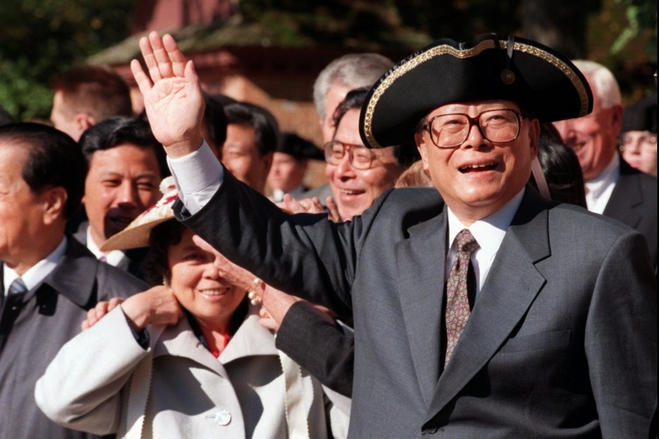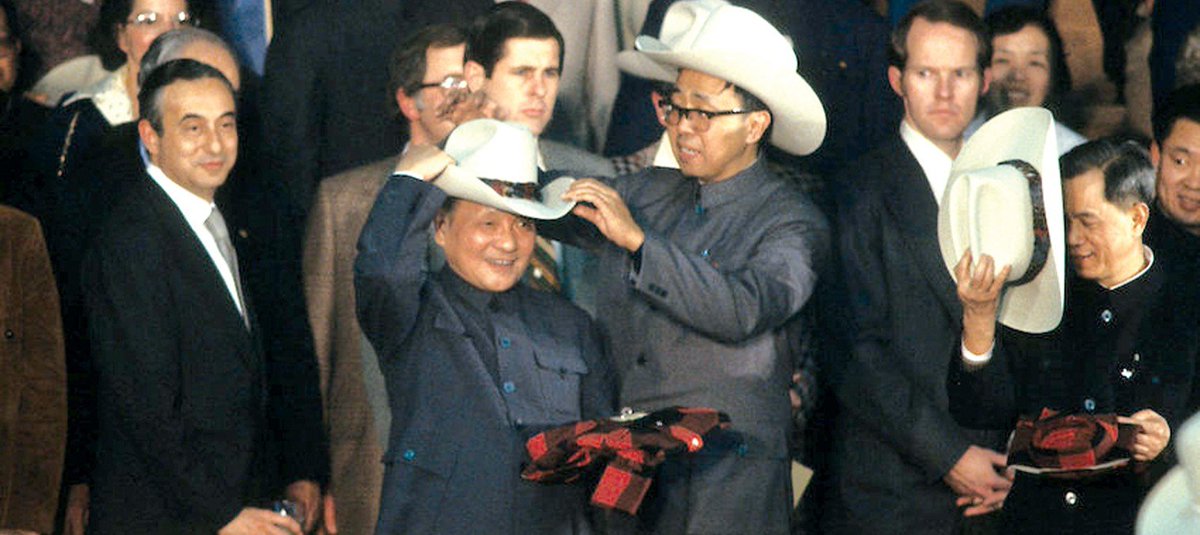1. This is an interesting point, and has spawned an interesting but chaotically sprawling discussion, so I'll try to organise my comments and rebuttals here
Broadly, there are kernels of truth in what Mr Yale says, but as is typical, insufficient consideration given to context https://twitter.com/will_yale/status/1278149574016655360
Broadly, there are kernels of truth in what Mr Yale says, but as is typical, insufficient consideration given to context https://twitter.com/will_yale/status/1278149574016655360
2. I'll first repeat that the tweet that prompted Mr Yale's comments, as well as similar objections from @Jacob_T_Gunter, refers to the imposition of an "us or them" choice on third parties
I do not claim that there was no hostility to the US in China https://twitter.com/Hubei_Peasant/status/1278152246841282562?s=20
I do not claim that there was no hostility to the US in China https://twitter.com/Hubei_Peasant/status/1278152246841282562?s=20
3. However, I argue that the claim that there has been a determined, implacable, and unreasonable asymmetric hostility to the US amongst the Party leadership cherry-picks evidence and ignores the asymmetric context of US-China interactions.
4. Throughout the history of antagonism before Nixon's visit to China, conflict has been perilously close to, if not on, China's home turf: the support of the KMT, the US-led invasions of Korea and Vietnam, and efforts to forment, train, and equip armed insurrection in Tibet
5. I'm astounded by the gall of the suggestion that the hostility was somehow symmetric, and that the US was more restrained, especailly given MacArthur's calls to massacre tens of millions of Chinese civilians with strategic nuclear bombardement https://twitter.com/will_yale/status/1278295163127967746
6. In fact, if anything should be shocking, it is the speed with which China volte-faced to embrace the US. Again, why should we take the low points instead of the high points as truly representative of the Party leadership's view of America?
7. When pressed for Chinese hostility to the US during the Hu years, beyond such extreme incidents, Mr Yale's examples conspicuously omit the US, and ignore the good-will expressed towards America during the Obama administration before the "Pivot to Asia" https://twitter.com/will_yale/status/1278165058183237632?s=20
8. Therefore, to infer "true" and "persistent" Chinese attitudes from the responses to these American interventions is at the very least as narrow-sighted as it would be for China to infer American intentions from them https://twitter.com/will_yale/status/1278149576319332352?s=20
9. Moreover, even in the cherry-picked cases, claiming that Chinese suspicion and hostility to the US is unreasonable completely ignores the context and unempathically fails to imagine the response if the roles were reversed, as @saultthomas points out https://twitter.com/saultthomas/status/1278290676967497728
10. "people would be angry" is a risible understatement
From the top of the political establishment to the streets, there would be howls for blood if a US embassy were bombed in similar circumstances, even if China issued similar denials and apologies https://twitter.com/will_yale/status/1278164960439177216
From the top of the political establishment to the streets, there would be howls for blood if a US embassy were bombed in similar circumstances, even if China issued similar denials and apologies https://twitter.com/will_yale/status/1278164960439177216
11. It is absurd to suggest that fallout from US-Israel incidents can provide an analogue to that from US-China incidents - can the context, viz. China's relationship with the US, be compared to the US's relationship with Israel? https://twitter.com/will_yale/status/1278297684655460352?s=20
12. Mr Yale also claims that it is the US and China's institutional differences that account for the alleged asymmetry of hostility
I believe that I have shown that context better explains any asymmetry of hostility, but even the institutional differences are misrepresented
I believe that I have shown that context better explains any asymmetry of hostility, but even the institutional differences are misrepresented
13. To suggest that these institutions constrains US aggression abroad ignores their complicity in mobilising public opinion to support exactly that
Surely I need not rake over their roles in the US's involvement in the Middle East? https://twitter.com/will_yale/status/1278299982794305537?s=20
Surely I need not rake over their roles in the US's involvement in the Middle East? https://twitter.com/will_yale/status/1278299982794305537?s=20
14. There is indeed an asymmetry in the nature of indoctrination in the US and China, but let us not ignore that the belief that the US should be a hegemonic enforcer and should actively export its values and institutions *is in itself an ideology* https://twitter.com/will_yale/status/1278300923287175169?s=20
15. To put it more clearly, while China might indoctrinate its people to distrust the US, the latter indoctrinates its people to believe that they are the rightful sole arbiters and executors of justice worldwide
That is liable to, and clearly does, generate hostility elsewhere
That is liable to, and clearly does, generate hostility elsewhere
16. To recap:
-Chinese attitudes towards the US are not of fundamental and unchanging hostility
-Instances of Chinese hostility are understandable in context
-American institutions and ideology generate hostility towards and from other countries in addition to China
-Chinese attitudes towards the US are not of fundamental and unchanging hostility
-Instances of Chinese hostility are understandable in context
-American institutions and ideology generate hostility towards and from other countries in addition to China
Mea culpa: the first incident is one involving the US, but once again, it is on China's doorstep
The US might have acted within international law, but still completely inconsiderately and provocatively
Imagine if China did the same on the Western Coast https://twitter.com/Hubei_Peasant/status/1278319366560415744?s=20
The US might have acted within international law, but still completely inconsiderately and provocatively
Imagine if China did the same on the Western Coast https://twitter.com/Hubei_Peasant/status/1278319366560415744?s=20

 Read on Twitter
Read on Twitter



